#Koimonogatari
Explore tagged Tumblr posts
Text
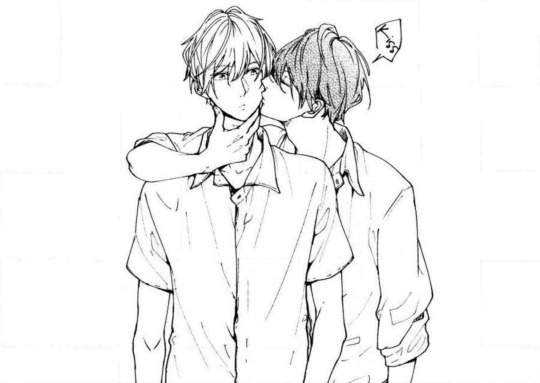
Source: koimonogatari
206 notes
·
View notes
Text
Coming-of-age BL Manga

Koimonogatari by Tagura Tohru
When Yuiji accidentally overhears his classmate Yamato confessing to another friend that he's gay, his perspective shifts. Seeing Yamato in a new light, Yuiji does his best not to let prejudice color his view, but he still finds himself overthinking his classmates' interactions now. He especially notices the way Yamato looks at one particular boy: Yuiji's own best friend. Even though he tells himself he shouldn't get involved, Yuiji finds he just can't help it; watching Yamato's one-sided love draws him in a way he never expected. At first, it's empathy, knowing that the boy Yamato has his sights on is definitely straight and has no idea. But as his own friendship with Yamato develops and the two of them grow closer through a mutual study group, Yuiji comes to truly care about Yamato as a person, regardless of his sexuality. He only wants Yamato to be happy, and to be able to express his true self.
Status: 2 Volumes (Ongoing)
Tagged: Drama, School Life, Slice of Life, Coming Out, Friendship, Insecurity, Unrequited Love, Romance
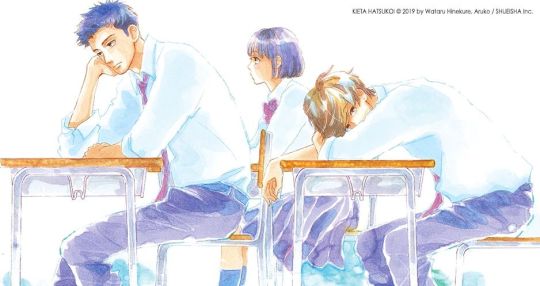
Kieta Hatsukoi by Hinekure Wataru
“Aoki, I didn’t know you thought about me that way.” Aoki has a crush on Hashimoto, the girl in the seat next to him in class. But he despairs when he borrows her eraser and sees she’s written the name of another boy—Ida—on it. To make matters more confusing, Ida sees Aoki holding that very eraser and thinks Aoki has a crush on him!
Status: 9 Volumes (Complete)
Tagged: Comedy, Romance, School Life, Bisexual, Misunderstanding, Romance

Hatsukoi Note by Amekiri
Shouya, a high school boy whose heart has never known romance, comes across an internet diary filled with wistful whispers of love toward the writer's same-sex crush. A photo posted to the page provides a hint as to the blog's owner: Tsubame, a fellow classmate known for being a lone wolf. Shouya realizes that his friend Ryuu is the object of the diary writer's affections, so he attempts to play matchmaker…but where will his own feelings take him in the process?
Status: 1 Volume (Complete)
Tagged: Drama, Romance, School Life, Yaoi, First Love, Misunderstanding

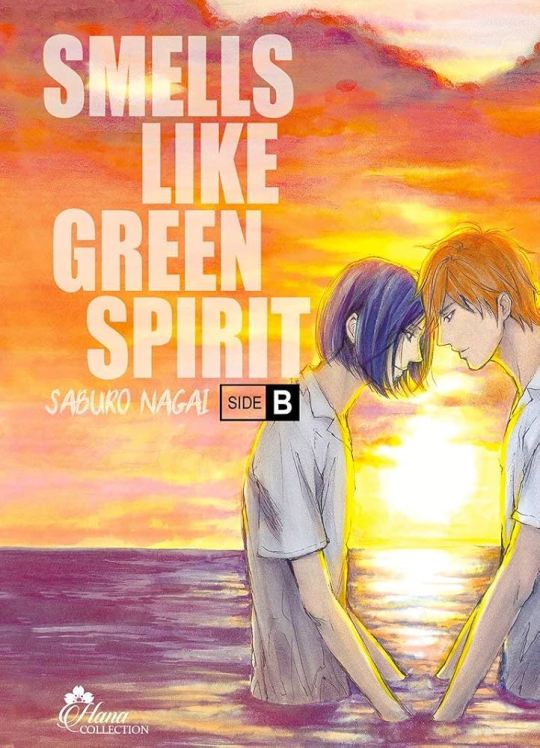
Smells Like Green Spirit by Nagai Saburou
Mishima, a student at a school in the countryside, is bullied by his classmates. The reason is because he's seemingly gay. In reality, Mishima does like guys so he doesn't resist their bullying, and instead, finds solace in secretly cross-dressing. One day on the rooftop, Mishima finds the lipstick he'd lost before in the hands of Kirino, one of the bullies… and Kirino was about to put on the lipstick that Mishima used on his own lips. This is the story of young boys looking for a place they can really be themselves…
Status: 2 Volumes (Complete)
Tagged: Drama, Psychological, School Life, Coming Out of the Closet, Countryside, Cross-dressing, Enemies to Friends
CW: Attempted Rape, Bullying, Homophobia
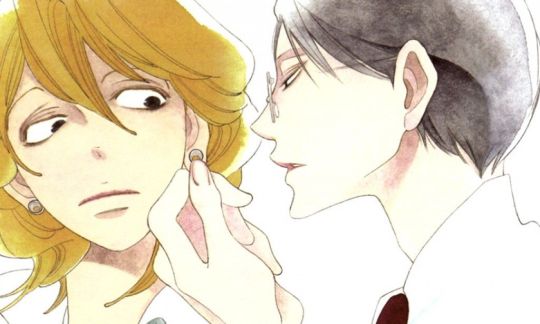
Doukyuusei by Nakamura Asumiko
Hikaru always thought his classmate Rihito was kind of a snob, until he stumbles across Rihito secretly practicing a song in an empty classroom. Hikaru agrees to become Rihito’s music tutor, and with each lesson the two boys grow closer. But when Hikaru realizes that he’s fallen for Rihito, will they stay classmates or become something more?
Status: 1 Volume (Complete) Has multiple sequels
Tagged: Drama, Romance, School Life, First Love, Opposites Attract

Blue Sky Complex by Ichikawa Kei
Narasaki only wanted a place where he could sit and read books in peace, but was blackmailed by his teacher into supervising a delinquent called Terashima while working at the school library. As they spend their days in silent but close proximity, they begin to feel drawn to each other. And then...
Status: 10 Volumes (Ongoing)
Tagged: Drama, Romance, School Life, First Love, Opposites Attract, Yaoi

Usagi no Mori by Enjo
Shunta and Tamaki are childhood friends with a year of difference, but Shunta feels something different towards his friend, an impure, not correct, dirty feeling. As this feeling grows stronger, will the relationship between the two friends also change ...?
Status: 3 Volumes (Ongoing)
Tagged: Drama, Romance, School Life, First Love, Childhood Friends, Psychological, Childhood Trauma, Yaoi

Monotone Blue by Nagabe
Hachi the cat finds most things monotonous, but at the top of his list is high school and all that comes with it. But when Aoi the lizard--a quiet, high-achieving transfer student--arrives, Hachi catches a glimpse of a brighter, more colorful life. If Hachi can help Aoi open up, unlocking new feelings in the process, maybe his life won't be so bland, after all.
Status: 1 Volume (Complete)
Tagged: Romance, School Life, Slice of Life, Anthropomorphism, Romance
This list on MB | more manga recommendations
last edited 19/dec/2024
Recommendations are always appreciated ^^
#i will be updating this post with more titles#koi monogatari and kieta hatsukoi are a must read imo#manga rec#Koimonogatari#Tagura Tohru#bl manga#Kieta Hatsukoi#Hinekure Wataru#Hatsukoi Note#Amekiri#Monotone Blue#Nagabe#coming of age#manga#rec#Smells Like Green Spirit#Nagai Saburou#Doukyuusei#Nakamura Asumiko#koi monogatari#bl manga rec#blue sky complex#kei ichikawa#usagi no mori#enjo#lemonidae
214 notes
·
View notes
Text
Hitagi End - An Analysis
Well, that’s it, folks. We’ve finally reached the end of the Monogatari series. It’s even right there in the arc title.
Hold on, I’m being told that there’s another whole season. What the fuck, I’ll be well into 2025 by the time I’m done with this.
But yeah, as usual with the naming scheme the second word seems to be the thing our title character has to confront - Hitagi is in active resistance against the End, and whether in the abstract form of the conclusion of the series itself, or the more literal threat of Sengoku Nadeko, there’s one common feature. Graduation.

One thing I remember vividly from Koimonogatari - from the first time I watched Koimonogatari, several years ago - is Kaiki’s offhand statement that Hitagi and Koyomi will probably break up in college. He says it so matter-of-factly, but it’s not something I ever considered, watching the rest of the series. I was fully immersed in the teenage perspective, convinced that nothing would ever end. It takes the perspective of a washed up older man to break the illusion, I suppose. You always hear the same complaint about romance manga - there should be more focus on after they’re already in a relationship. Getting together shouldn’t be the story’s end.
One reason why it might be the story’s end is because as long as it ends there you can convince yourself it will last forever. Their relationship will never sink to the level of mundanity, of lovers’ quarrels - there will never be the possibility of being interested in someone else, finding someone else, being replaced.
That is the kind of idealistic, indulgent, static ending that Sengoku Nadeko desires, and as a result is the kind of ending that Senjougahara Hitagi fights against.
This is where I say something about Kaiki Deishuu. Something to make sense of what he’s doing in this story. He’s a man in search of an ending, I could say. Ever since the death of Gaen Tooe, he’s been looking for a way to move on. Perhaps this is why he tells Nadeko the same cause of death - the person you have a crush on died in a car accident. So mundane, so unexpected, so implausible. He thinks she will accept it. Does he?
He’s a man who’s already met his end, I could say. Such is the fate of the specialists. They’ve already graduated, already long since handled their personal agreements and disagreements. They’re stuck, now, bound to their own nature, their own rules. They appear only as supporting characters, never the protagonist. Well. I guess that’s a lie.
In adopting narrators other than Koyomi, Second Season shifts the focus away from his obsession with helping and connecting to others. Koyomi’s interactions with and idealization of women results in a sense of distance - he struggles to see himself in them and their problems. How much of his attempts to cross that distance are really just attempts to help himself?
This dynamic collapses when the female cast, facing their own issues, are made protagonists in their own right. They experience themselves as the Other, & Koyomi’s standard process of understanding the girl by first understanding the oddity becomes in these cases a process of self-exploration.
And yet here we are, back to seeing a male protagonist confronted with the issues of women that he struggles to understand.

I don’t mean to rag on men, exactly, I just think back to how there tends to be less distance between Koyomi and other men, how he’s more capable of seeing them as another version of himself, and I think that the best explanation for Kaiki’s presence here is that he’s filling in.
He himself thinks so, although it’s Oshino, and not Koyomi, that he considers.


Regardless, the parallels to Koyomi are established firmly enough by the ending. Kaiki was poison to Hitagi but a surprising help to Nadeko, while Koyomi is the opposite. Put that way, their differences and similarities seem readily explicable. Koyomi saves people. He forgives the harm they do to him. It works for the prickly Hitagi, who needs a pillar of support, but not Nadeko, who needs to be told that she isn’t a victim.
Kaiki lies to people, but that doesn’t mean he’s trying to hurt them. Ononoki proposes a reading of his involvement with Hitagi where he had no ill intentions whatsoever. He didn’t try to free her from the crab simply because he didn’t think it would help her to regain what she had lost. He caused her parents’ divorce to keep her from under the thumb of her mother. He even swindled the cult, although more as an act of revenge than anything. Perhaps there was some impropriety in their relationship, perhaps he exploited her feelings for him, but our understanding of the events is vague enough to give him the benefit of the doubt if we really want.

Kaiki fails to help Hitagi, not (just?) because he’s trying to scam her, but because he’s fundamentally incapable of being honest with her. All his actions move around her and ignore her wishes.
When it comes to Nadeko, on the other hand . . . I mean, it doesn’t initially seem like he’s doing much better, does it. He has no luck with his manipulations, with currying favour, with bold untruths. In the end though, the way he helps Nadeko is a lie that they both know is a lie. Really, it’s more like telling her a story.

And I’ve written before about how Nadeko needs stories.

Kaiki doesn’t tell her anything that another person couldn’t have. Koyomi, Hitagi, even Nadeko herself is probably aware of similar advice on some level. Don’t throw your life away pointlessly. If you want to do things, then you should do them. You can’t succeed unless you try.
Kaiki’s talent is simply in recognising that Nadeko needs to hear it. Koyomi wouldn’t have thought to say it, because he doesn’t know why she became a snake god. She doesn’t want to tell him either. He’s stuck.
But it’s not as if Kaiki has some unique insight into her psychology that lets him work this out. As he puts it, he’s not like Oshino. He didn’t ‘see through’ Nadeko, he just straight up ‘saw’ it. He broke into her room, twisted open the lock to her closet with a 10 yen coin and fucking looked. Her parents didn’t know what was in there, Koyomi didn’t know what was in there, Tsukihi didn’t know, Oshino didn’t know, even Hanekawa who heard about it from someone else and thought it might be an important detail couldn’t possibly know without opening the god damn closet.
This is where Kaiki’s habit of working around people becomes useful. Because more than anyone else, he recognises that Nadeko might be fine as a god, just as he thought Hitagi might be fine staying weightless two years ago. He’s not trying to save her. He’s not trying to do what’s best for her. He’s simply trying to scam her, with all the lack of respect for her personal belongings that implies.
This establishes, perhaps, an important difference between Koyomi and Kaiki, but it also establishes a similarity. In dealing with oddities - in dealing with people - the key is getting to know them.
This is something Koyomi struggles with, out of a fear of being too forward, a fear of hurting them, a lack of appreciation of his own value, as a kind of half-person, a fake person, that could only weigh others down. Kaiki embraces his nature as a fake and adopts only the most rational and most unscrupulous methods of approaching others.
The question, I suppose, is why? What does Kaiki get out of playing a character that informs all of his actions without explaining them? What does he get out of remaining unknowable even to himself, reacting with surprise to his own feelings and motivations? What does he get from acting without thought, tossing away caution, tossing away patience, and tossing away money in an attempt to toss away the past?

Kaiki values money for its endless acceptability, its exchange value. He doesn’t wish to have money, he wishes to use it, and in keeping with this philosophy, he considers nothing irreplaceable, not even himself. The person named Kaiki Deishuu is deliberately false, deliberately contradictory, and he’s long since given up on getting to the bottom of that particular well.

I begin to understand why he comes up, now, in relation to Nadeko, who is lost in a web of her own identity.
Sengoku Nadeko is telling herself a story. She has to, in order to not hate herself. She is, and will continue to be, in love with Koyomi-oniichan. This isn’t something that motivates her actions in the conventional sense so much as a wall to keep out the world, to assert that she is normal. So why does she still hold onto it, in this situation where it has become so far beyond normal?

Because she considers it part of herself. She is still playing the role of Sengoku Nadeko, and she can’t cast aside the most Nadeko piece of herself, the piece that she has spent the most time and effort showing off to other people. It would call her existence into question, make her look fake, make her feel empty. The sense of normalcy she’s trying to achieve is not in how other people see her, it’s in how she sees herself. She takes the pieces of herself that are left, the pieces of herself she’s been given, and pulls them together into a story that makes sense. To her, loving herself means never changing, never throwing parts of herself away, never identifying a problem in her own behaviour.

She’s happy, Kaiki thinks. It feels a little different from the end of Otori, where Kuchinawa was still presented as a separate existence. He no longer pokes at Nadeko’s insecurities, at least not obviously. In recognising her own role in the whole affair, Nadeko is no longer worried about hurting others, of being seen as a victim, because she fully acknowledges herself as the one with all the power in her interactions. Godhood is an unusual role for her, but she seems happy to take it up, viewing her job as responding to the prayers of worshippers. It's a much simpler, more transactional view of social relations than she had to navigate as a human. She likes people who are nice to her and doesn't like people who aren't.
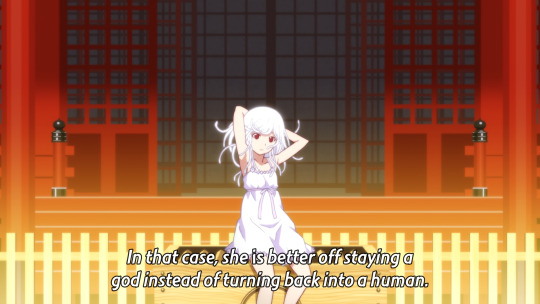
Ultimately, though, she's still playing a part, putting on a performance for Kaiki’s benefit. Her cutesy habits as a god are a far cry from the more genuine rage she expresses in the classroom in Otori. But then again, she doesn't have to worry about that, because she's not a human. She's no longer a part of society, with all the freedom that entails. An entirely negative freedom, of course. She doesn't have to do anything and thus there's nothing for her to do, besides play games with Kaiki and drink the alcohol she could only sneak sips of behind her dad’s back at home.

She’s happy, but does that matter?
Kaiki doesn’t think so. The other parallel established in the ending is between Nadeko and Hitagi. Compared to Nadeko as someone who never throws anything away, Hitagi is someone who rejects unnecessary things, rejects convenient narratives of victimisation, rejects divine assistance.
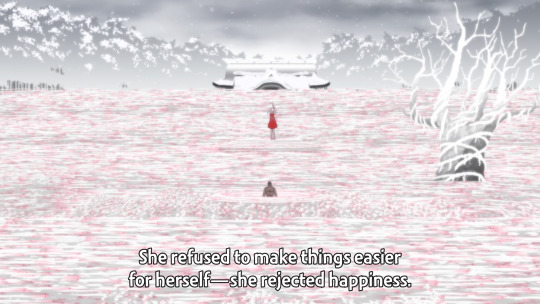
Nadeko is broken, thinks Kaiki. Like Hitagi’s mother. Like Hitagi almost was. And being broken has a specific meaning for him - it means no longer accurately recognising the value of the things you have. Nadeko overvalues the things that play an important role in her delusions and ignores everything else. In comparison, think back to Hitagi listing out everything she has to Koyomi back in Bakemonogatari. She has so little, but it’s all precious to her. Not only that, but she manages to offer it to another person. It’s only in recognising the value of herself and also someone else that they can form a mutually beneficial ‘exchange’, a real connection.

In Bakemonogatari, Hitagi’s self is framed as a series of external objects. You are the people around you. In Koimonogatari, Kaiki’s self is found in his money. Endlessly exchangeable, never unique, always mercenary. He offers himself up to Nadeko and gets nothing in return, because she fundamentally doesn’t value what he’s bringing her. Donating to a shrine at New Years’ is a sucker’s game, Kaiki thinks at the beginning of the novel, and he’s proven right enough.
For Kaiki, you could say that the money he spends is spent on himself, on presenting a certain image of himself. So what of the money he takes from others?

He accepts Hitagi’s woefully low payment for the job. He accepts it as a job, because if it’s not a job he’d have to start thinking about what his relationship to her is, if not client and employer. It would become unique, no longer exchangeable for any of the other half-dozen scams he’s running.

He accepts Izuko’s 3 million severance fee. He accepts it and goes on working. It’s unlike him, Yotsugi says. He’s contradicting himself. The money isn’t being exchanged for anything, he’s just taking it. But isn’t that the job of a scammer? To get as much money for as little effort as possible? Then why does he keep doing the job?

He’s acting unlike himself. Throughout the novel, he’s constantly pointing out new sides of himself. Phrases he’s said for the first time. Actions he’s never done before. After a certain point, I have to conclude he’s lying. Kaiki acts unlike himself in Koimonogatari because acting unlike himself, unlike the persona he deliberately acts as, is one of his most characteristic actions.
Being a specialist is about balance - or at least so we would assume from the actions of Oshino Meme. It’s about give-and-take. But Kaiki is a fake specialist, a conman. He should only want to take. It’s not a coincidence, then, that he keeps giving.
I understood it on an intellectual level, but now I get it. I really fucking get it. He’s just, so, Araragi Koyomi. He’s so thoughtless and impulsive, so concerned with appearances, enamoured with his own edginess, stubborn, self-deprecating, cowardly, dense, inconsiderate, self-sacrificing, willful, proud of outsmarting children, reluctant to commit to anything, and most of all half-assed.

That is the characteristic trait of Araragi Koyomi as I understand it. He’s trapped between worlds, vampire and human, but doesn’t seem particularly inclined to choose one or the other. He doesn’t just look to the future, but the past too. In reaching towards what he wants, he’s immensely reluctant to give up what he already has.

All the way back in Nekomonogatari Kuro, he characterises Hitagi and Suruga as different to him, more forward-looking, prefiguring Kaiki’s comments about Hitagi as someone willing to throw aside the most important things to her to get what she wants.
It’s funny, because in doing so he also talks about Tsubasa as someone who’s the same, who also looks for solace in the past. Tsubasa, who in Nekomonogatari Shiro we come to understand will casually cast aside the past if it doesn’t suit her.
She has a different perspective, you see. She thinks Koyomi is different from her. He’s ‘unshakable’, in her words, not concerned about losing his identity. Precisely because he keeps looking back, because he keeps confronting his past, he’s able to accept all of himself, unlike her.
Despite Monogatari being a series about people changing, several times characters espouse the idea that you can’t change, not really.

The thing is that while change is obviously possible, what this idea cautions against is ignoring and forgetting about what you used to be like. Tsubasa can’t just make a new version of herself whenever things start getting difficult, she has to understand herself as a continuous person composed of everyone she’s ever been.
The Rainy Devil teaches Suruga something similar, as regardless of the kind of person she wishes to become, the arm can’t fundamentally transform her. It simply shows that she was already the kind of person who could learn to run fast, already the kind of person who wanted to brutalize Hitagi’s new boyfriend. Koyomi’s idea that she’s somehow more forward-looking than him seems laughable when she feels as though Hitagi and her issues are something that she ran away from.
It’s a fundamentally half-assed application of Numachi Rouka’s methods - for running away from your problems to work you have to remain detached, and the devil’s grasping arm is evidence both of Suruga’s failure in that regard, but also of the attachment to life itself that Rouka lacked. No wonder it felt off when it suddenly disappeared in Hanamonogatari.
At the same time, though, losing the arm is evidence of her change throughout that arc. Her running no longer isolates her, but instead can be seen as a way to connect with others. It’s no coincidence that’s how she ends up meeting Koyomi near the end. It’s his advice that gives her the confidence to get over the finish line, but the first step is abandoning everything and just running - not trying to beat anyone, not trying to hold back, with no particular goal or attachment to a wish. It’s the first time she really can since she started using the monkey’s paw.
Notably it’s Kaiki that offered her an alternative and advised her to just let Rouka have the parts. Kaiki, the one who seemed to be collecting them himself. Isn’t the concept of him possessing what is in a very real sense the remains of Gaen Tooe so fascinating? But it’s the yet-living Suruga that he calls her legacy. It’s hard to say if meeting her, in some way, helped him move on.
Once again, we see a difference from Koyomi, who advises Suruga to act like herself and do what she wants. Kaiki tells Suruga to do what’s easy, what would cause less difficulties for her, in a similar way that he seems to understand Nadeko is much happier as a god and Hitagi wouldn’t have to confront her memories of her mother as long as she remains weightless.
By regaining her weight and her emotions, nothing will change, Oshino cautions Hitagi. She won’t suddenly make up with her mother. But it does allow her to move forward, to value her memories correctly, not allow her missing weight to weigh on her so much that she will never be able to become close to anyone else.
“She’s different now, more so than if she were a different person” Kaiki says, and it’s so easy to read him as relieved that she’s not stuck as she was when he fucked her up. That she’s still always in the moment where she truly fell in love for the first time. That she was able to remain the same person while still loving someone else.

Tsubasa’s immense righteousness is subverted in Nekomonogatari, Suruga’s seeming single-mindedness is deconstructed in Hanamonogatari, and despite the effusive words of praise they both have for Koyomi Araragi it’s evident from his internal narration that he’s more pathetic and wavering than anyone else - and perhaps that’s how one ought to be, here. Never able to make a decision on what’s most important. Always most invested in whatever you’re doing right now, whatever person is right in front of you.
Hitagi is a character that we never see from the first person. Koyomi’s view of her as a titan striding headlong towards her goals is never really contradicted in the story, because despite her immensely evident vulnerability, she’s shown as making a more active effort to move on than anyone.
The shadow of her past relationship with Kaiki hangs over Koimonogatari like a specter.
In Nisemonogatari it’s mentioned that her animus towards Kaiki probably comes from the fact she wasn’t able to hate him in the past. While she was still under the influence of the crab, her emotions regarding her mother were dampened. Kaiki’s acts of splitting her family up likely wasn’t something she was capable of expressing her resentment for at the time.
If you think of that hatred as a final remaining regret, her kidnapping of Koyomi and confronting of Kaiki in Nisemonogatari the expression of such, then it makes sense that Nisemonogatari also marks the start of her mellowing out, never again reaching the heights of violence she demonstrates at the beginning of that novel.
An interesting thing about Kaiki’s role there, looking back, is that he’s clearly aiming for that outcome. As soon as Hitagi confronts him, he leaves. He tells her to stop worrying about the past, about the fact that she once had a relationship with him, because he’s thoroughly uninterested in her as she is now. He provokes her into affirming her current self and relationship with Koyomi. And he says that the man who tried to violate her died in a car accident.
Is he lying? Is it just a coincidence, that he goes with the same manner of death as Gaen Tooe, the same line he feeds to Sengoku Nadeko?
Either way, the purpose of the line becomes a little clearer. He’s trying to get her, both of them, to move on. To understand that the people who seemed so important to you are mundane, the events that shaped your lives don’t mean anything in the big picture, and your past is just that. It’s over. It’s the end.
He almost embodies the concept, in Koimonogatari. We see from his perspective and he is indeed far less ominous, far less portentous, far less important, than he seems from the third person.
He’s also really bad at it. Despite his exhortations to ignore the past, he himself clearly still cares a lot about Hitagi. She as well can’t quite avoid falling back into old patterns of banter, admiration, reliance.
And his ideology isn’t enough for Nadeko. He can’t just deny what she’s clinging onto now, he needs to give her something new. They called Osamu Tezuka a God, she says, hesitantly forming a bridge between her current self and the future she wants to inhabit. Telling herself a convenient story that patches it all up.

It results in an oddly ambiguous message. Nisio loves his tricks, revealing something the narrator was mistaken about at the very end, but when Hitagi says she never loved him and hangs up it’s hard to tell which one of them came out ahead in that little back and forth. Maybe Kaiki, the eternal washout, was so enamoured of his own unique subjectivity he never considered the schoolgirl he was scamming wasn’t so enamoured of him.

Who am I kidding, it doesn’t feel that way at all. Her rejection of the idea that she ever liked him was unconvincing in Nisemonogatari and it’s unconvincing here. And the novel frankly endorses that wilful self-denial. Perhaps it’s important to always act like you’ve fallen in love for the first time. Perhaps it’s important to believe that you’ll never break up with your boyfriend.
In this seeming endorsement of Kaiki’s ideology, I have to wonder what kind of End Hitagi is even fighting against.
Nadeko asserts that a single failure is the End, it’s Nadekover, she has no choice but to kill everyone and then herself. In resisting her, Hitagi asserts her right to change, to move on, to love Koyomi even after her life was destroyed by Kaiki.
On the other hand, Kaiki asserts that failure means nothing, he doesn’t care about anything that has ever happened, after this he’ll just move on and start another moneymaking scheme, same as the last. Hitagi also resists this. She must, if she is to believe her relationship with Koyomi matters in the first place. Her denial that she ever liked Kaiki ends up an odd sort of validation for their relationship. If she did crush on him, that would be important to her, therefore it didn’t happen.

It perfectly mirrors Kaiki’s refusal to admit he ever cared about her. It puts the lie to his whole persona, but, like, it’s supposed to be a lie anyway, I think. They’re both lying to each other and themselves all the time, so much so that they fail to understand even the most straightforward exchanges between them. It’s fine, honestly. They don’t need to be true to each other as long as they’re true to themselves.
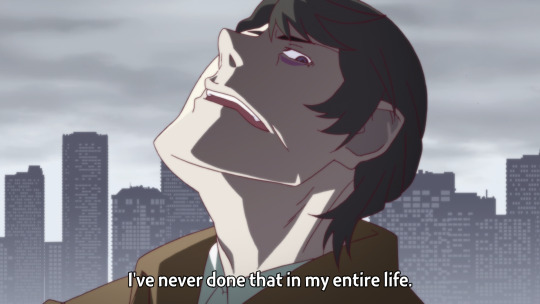
One thing that I never really mentioned is the other way you could take this arc title. Hitagi End as in the end of Second Season - the end of the series as a whole, potentially, if you take Nisio’s afterwords seriously (he doesn’t, as evidenced by the several previous times he’s pulled this exact gag).
Astute fans of the anime airing watch order will note that placing Hanamonogatari, an arc set well in the future, before this one robs it a little of that sense of finality. Nadeko is not so much of a threat, knowing our protagonists survive. This is of course the twist, the lie, the joke of this arc. Life goes on, almost interminably so. The idea that graduation would be the End for Hitagi and Koyomi is as ridiculous as the idea that making some mistakes at fourteen would be the End of Nadeko.
Even Kaiki’s attempt to escape the narrative, put a pin in the whole thing by killing himself off, is neatly and instantly subverted by remembering his presence in Hana. It’s not supposed to be a reveal, exactly, that this man is a liar. It’s just there, from the first page to the last.
After Ononoki cautions Kaiki that he’s acting unlike himself, before he goes to talk to Nadeko for the final time, she spends a bit of time telling him what Kagenui’s been up to. Sounded like she was the same as ever, he thinks. I think of this, amongst all his attempts to dramatize his own life, differentiate himself from himself, craft his own ending. His life keeps going on, and Kagenui’s still marching to the beat of her own drum, same as ever.
Happy New Year!
63 notes
·
View notes
Text

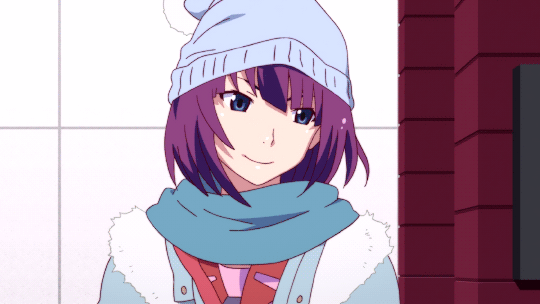
#monogatari#monogatari series#koimonogatari#hitagi senjougahara#gif#gif: monogatari#happy bday to best girl
779 notes
·
View notes
Text
my favorite koimonogatari factoid is that theres two duet versions of Kogarashi Sentiment, one version is with Kaiki and Senjos VAs with all their character and imperfections, and the other version is with two completely different singers who are clearly professionals and get all the flare and vibrato you'd expect out of them
(the uploaded tracks are quiet for a few seconds)

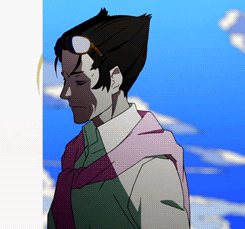
#might be one of my fav touches for the ost#above and beyond!#monogatari#koimonogatari#i had to mess with the start times for theses songs to go through i hope i dont get nuked for it lol...
195 notes
·
View notes
Text
she bake/kizu/nise/neko-kuro/neko-shiro/kabuki/hana/otori/oni/koi/tsuki/koyomi/owari/zoku owari/oroka/waza/nade/musubi/shinobu/yoi/amari/ougi/shinomo/ikusa/tsugi on my mono til I gatari
#monogatari#bakemonogatari#kizumonogatari#nisemonogatari#nekomonogatari#kabukimono#hanamonogatari#koimonogatari#tsukimonogatari#owarimonogatari#I spent way too much time on this post please laugh
106 notes
·
View notes
Text

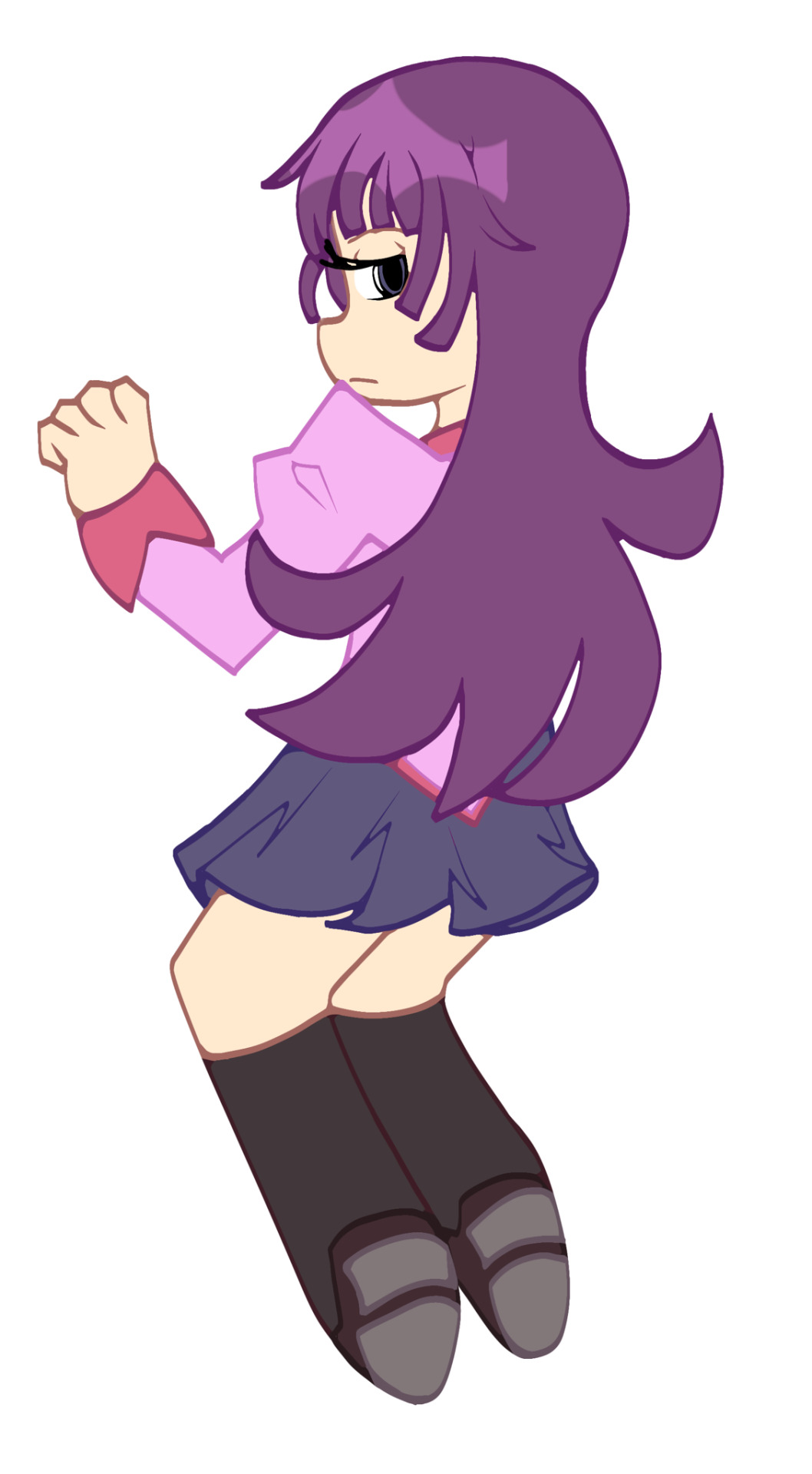
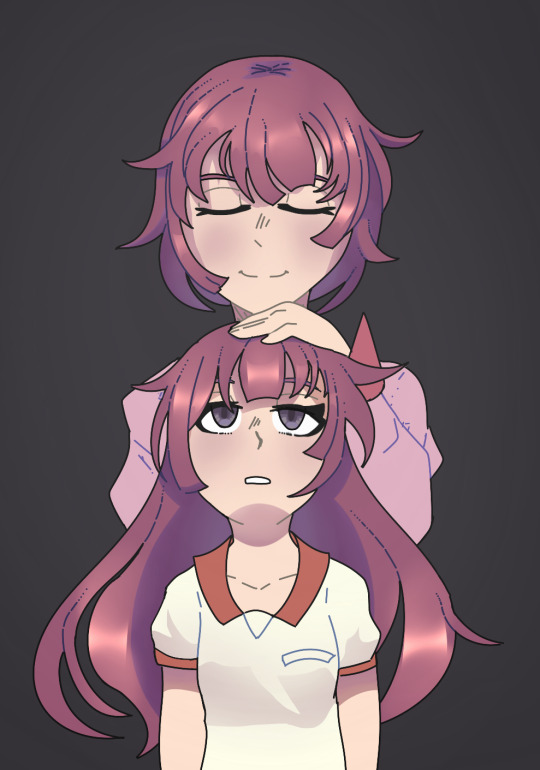
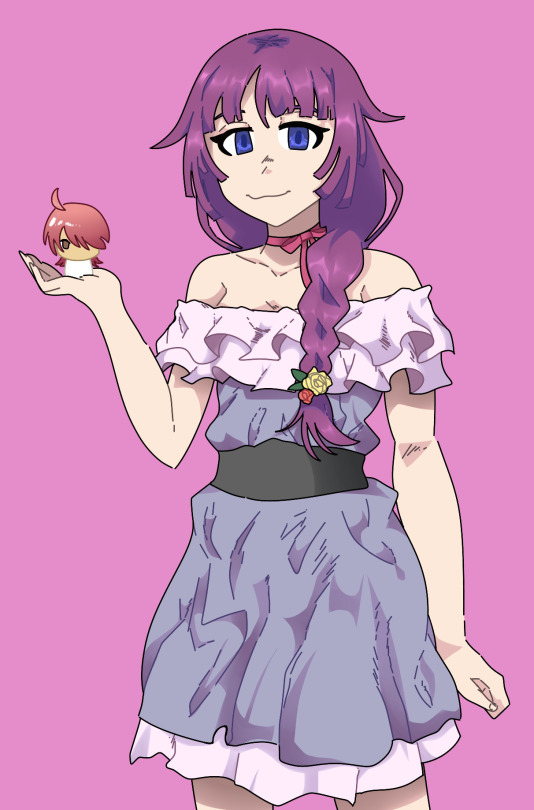




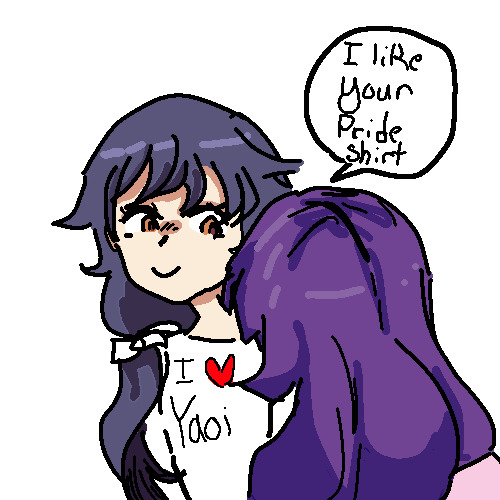
All the Senjougaharas I’ve draw!!
#digital art#fanart#procreate#bakemonogatari#monogatari#monogatari series#senjougahara hitagi#koimonogatari#koyomimonogatari#nisemonogatari#nekomonogatari#hanekawa monogatari#monogatari hanekawa#hanekawa black#tsukimonogatari#hanekawa tsubasa#tsubasa hanekawa#hitagi senjougahara#made in ibis paint#ibispaint art#ibispaintdrawing#ibispaintx#csp art#my art#artwork#digital drawing#digital illustration#digital painting#compilation#suruga kanbaru
72 notes
·
View notes
Text
15 notes
·
View notes
Text

Why tf is Tsukishima Kei blackmailing the gays in my BL manga?
11 notes
·
View notes
Text
what do you mean this isnt how it went
#monogatari#monogatari series#Monogatari series second season#koimonogatari#nadeko Sengoku#sengoku nadeko#kaiki deishu#deishu Kaiki#deishuu Kaiki#kaiki deishuu#nisioisin#nisio isin
103 notes
·
View notes
Text
man i seriously miss koimonogatari 😭😭😭 when is the next chapter coming out man…. crying
21 notes
·
View notes
Text








Yamato & Yuiji (Koimonogatari - Tagura Tohru)
36 notes
·
View notes
Text
Koimonogatari is going to update when we're rotting away 6 feet under. The drama was getting so good, I can't be patient anymore I want to see what happens next!!
37 notes
·
View notes
Text
Meus manhwas/manga favs pra vcs, mero mortais, lerem
Koimonogatari:

Meu resumo: Gay loro, garoto ""homofóbico"" e observador. Garoto moreno descobre q garoto loiro é gay, aprende sobre a homossexualidade e os medos/julgamentos que pessoas homossexuais sofrem, enquanto ajuda o seu novo amigo loiro e deseja profundamente que ele seja feliz 👍🏽
Sinopse: Hasegawa Yuiji descobre sem querer que seu colega de sala, Yoshinaga Yamato, é gay. Eventualmente, ele percebe que o olhar de Yamato está sempre direcionado a um amor não correspondido. Através de um grupo de estudos, Yuiji vê que Yamato é um "cara muito legal" e, apesar de todo seu estranhamento, começa a desejar que ele seja feliz...
Debut or die:

Meu resumo: Garoto depressivo e fotógrafo possui o corpo de um garoto solitário, depressivo e órfã. Ele tem a missão de virar um idol, se não a cabeça rola
Sinopse: Há três anos, um aluno que se preparava para o exame nacional pelo quarto ano seguido, de repente, se viu em um corpo desconhecido. Assim como também viu uma janela de status exibindo uma ameaça na frente de seus olhos! [Emergência!] [Evento de upgrade: “Debute ou Morra” está começando!] Um livro sobre a transformação do personagem principal, que, de repente, foi desafiado, pela súbita mensagem de morte, a ser um ídolo, embora nunca tenha estado na indústria antes. Especialidade: Ele costumava vender dados de idols.
Return of the mount hua secret :

Meu resumo: Velho lindo e forte morre dps de finalmente matar o demônio filho da puta q quer destruí tudo e dps de 100 anos reencarna em um mendigo. Ele descobre que sua seita foi destruída e vai fazer ela ficar no topo dnv. Um real amassa figurante 👍🏽
Sinopse: Chung Myung, o 13º discípulo da seita Mount Hua, um dos três grandes espadachins, Plum Blossom Sword Saint, derrotou Chun Ma, que trouxe destruição e desordem ao mundo. Após a batalha, ele dá seu último suspiro no topo da montanha-sede da Seita Demônio Celestial. Ele renasce após 100 anos no corpo de uma criança. ……O que? A seita Monte Hua caiu? Que tipo de bobagem é essa!?
Favs são só, mas tem uns que eu tô lendo, se vcs quiserem que eu faça recomendo eles, escreve aí 🤠
#koimonogatari#debut or die#return of the mount hua sect#volcanic return#recomendação#recomendation#recomendaciones#sinopse
8 notes
·
View notes
Text


Getting conflicting information here
11 notes
·
View notes
